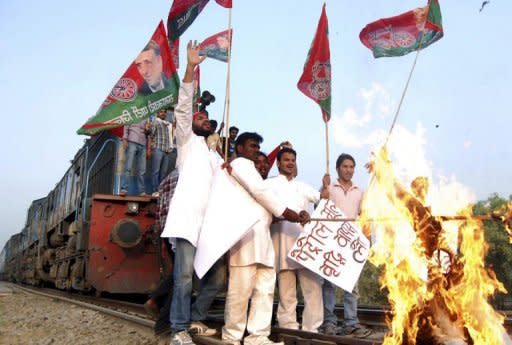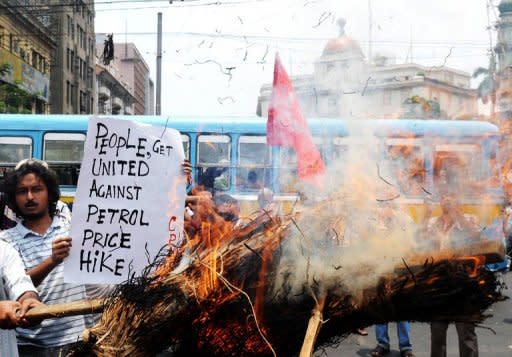Indians in nationwide strike over fuel prices
A nation-wide strike against rising petrol prices in India closed shops and disrupted public transport on Thursday, with the under-fire government facing new dissent over its economic management. Opposition political parties and trade unions enforced a shutdown in many cities, with anti-government marches held in New Delhi and commercial hub Mumbai. "Our protest is successful," claimed Prakash Javdekar, spokesman of the main opposition Bharatiya Janata Party (BJP). "Millions of angry Indians are protesting against the petrol price rise. "The government will have to change their decision now," he told AFP. In New Delhi, most shops were closed and traffic was extremely light, with many workers deciding to stay home because of the lack of public transport. In Mumbai, the Shiv Sena party, a BJP ally with a history of violent protests, instructed residents that they "should not venture out of their houses" and there were reports of buses being stoned and offices attacked. The strike came on the same day as shock economic growth figures for the January-March quarter showed the slowest quarterly expansion in nine years, of 5.3 percent. The flagging economy, high inflation and a string of corruption scandals have weakened the coalition government headed by 79-year-old Prime Minister Manmohan Singh and his Congress party. Last week, Indian state-run oil firms announced the sharpest jump in petrol prices in nearly a decade to offset growing losses caused by subsidised rates. Once taxes are included, the price increase of 6.28 rupees (11 US cents) per litre will result in a 7.5-rupee hike for consumers in cities such as Delhi. The government faces pressure from the street to help the poor with the rising cost of living in India -- annual inflation is running at 7.0 percent -- but analysts say subsidies must be contained due to a gaping public deficit. "The price rise is killing us and the government is sleeping but today will wake them up," said Ravikant Sahai, a grocery shop owner in New Delhi. Sahai, 43, said he would not open his shop and hoped many other traders would join the strike. "Petrol price rises hurt everyone. Our business suffers. Why is this government determined to hurt us?" he said. R.K. Singh, the chairman of Bharat Petroleum Company Limited, a state-run fuel retailer, told India's CNBC-TV18 channel that retail petrol prices might be cut by up to two rupees a litre due to falling crude prices. "We are working it out. By the end of the day we will come out with the exact number which will be announced tomorrow (Friday)," he said. "There is a possibility of a reduction on the basic price." In 2010 the government deregulated petrol prices in a reform aimed at reducing the massive subsidies it pays to state-run fuel refiners which rely on imported energy. A series of smaller petrol price increases last year caused a major headache for the government with the second-largest party in the ruling coalition threatening to pull out.




